西电选修课影视鉴赏结课作业
选修课影视鉴赏作业答案
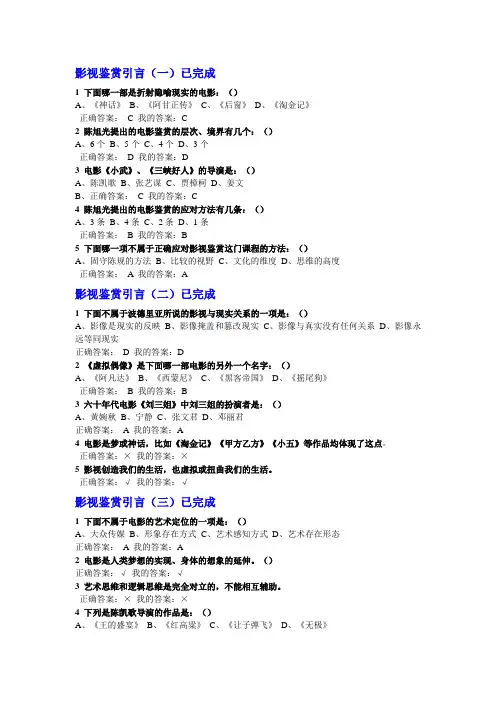
影视鉴赏引言(一)已完成1 下面哪一部是折射隐喻现实的电影:()A、《神话》B、《阿甘正传》C、《后窗》D、《淘金记》正确答案:C 我的答案:C2 陈旭光提出的电影鉴赏的层次、境界有几个:()A、6个B、5个C、4个D、3个正确答案:D 我的答案:D3 电影《小武》、《三峡好人》的导演是:()A、陈凯歌B、张艺谋C、贾樟柯D、姜文B、正确答案:C 我的答案:C4 陈旭光提出的电影鉴赏的应对方法有几条:()A、3条B、4条C、2条D、1条正确答案:B 我的答案:B5 下面哪一项不属于正确应对影视鉴赏这门课程的方法:()A、固守陈规的方法B、比较的视野C、文化的维度D、思维的高度正确答案:A 我的答案:A影视鉴赏引言(二)已完成1 下面不属于波德里亚所说的影视与现实关系的一项是:()A、影像是现实的反映B、影像掩盖和篡改现实C、影像与真实没有任何关系D、影像永远等同现实正确答案:D 我的答案:D2 《虚拟偶像》是下面哪一部电影的另外一个名字:()A、《阿凡达》B、《西蒙尼》C、《黑客帝国》D、《摇尾狗》正确答案:B 我的答案:B3 六十年代电影《刘三姐》中刘三姐的扮演者是:()A、黄婉秋B、宁静C、张文君D、邓丽君正确答案:A 我的答案:A4 电影是梦或神话,比如《淘金记》《甲方乙方》《小五》等作品均体现了这点。
正确答案:×我的答案:×5 影视创造我们的生活,也虚拟或扭曲我们的生活。
正确答案:√我的答案:√影视鉴赏引言(三)已完成1 下面不属于电影的艺术定位的一项是:()A、大众传媒B、形象存在方式C、艺术感知方式D、艺术存在形态正确答案:A 我的答案:A2 电影是人类梦想的实现、身体的想象的延伸。
()正确答案:√我的答案:√3 艺术思维和逻辑思维是完全对立的,不能相互辅助。
正确答案:×我的答案:×4 下列是陈凯歌导演的作品是:()A、《王的盛宴》B、《红高粱》C、《让子弹飞》D、《无极》5 影评人路易·德吕克是哪个国家的:()A、法国B、意大利C、英国D、美国正确答案:A 我的答案:A6 麦克鲁汉曾说“我要给观众不无裨益的惊吓。
影视鉴赏课后答案
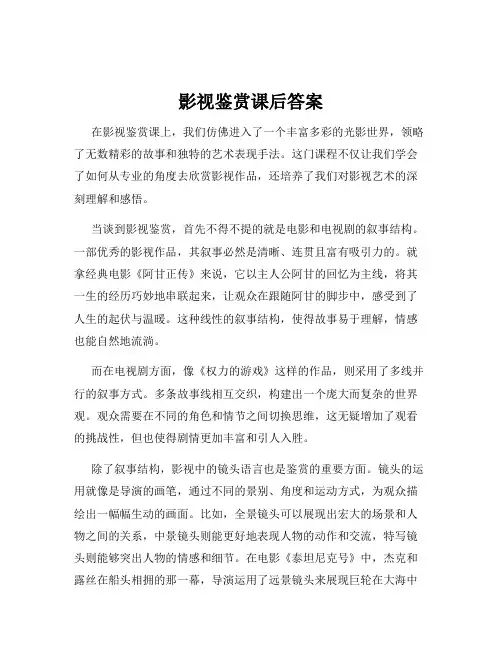
影视鉴赏课后答案在影视鉴赏课上,我们仿佛进入了一个丰富多彩的光影世界,领略了无数精彩的故事和独特的艺术表现手法。
这门课程不仅让我们学会了如何从专业的角度去欣赏影视作品,还培养了我们对影视艺术的深刻理解和感悟。
当谈到影视鉴赏,首先不得不提的就是电影和电视剧的叙事结构。
一部优秀的影视作品,其叙事必然是清晰、连贯且富有吸引力的。
就拿经典电影《阿甘正传》来说,它以主人公阿甘的回忆为主线,将其一生的经历巧妙地串联起来,让观众在跟随阿甘的脚步中,感受到了人生的起伏与温暖。
这种线性的叙事结构,使得故事易于理解,情感也能自然地流淌。
而在电视剧方面,像《权力的游戏》这样的作品,则采用了多线并行的叙事方式。
多条故事线相互交织,构建出一个庞大而复杂的世界观。
观众需要在不同的角色和情节之间切换思维,这无疑增加了观看的挑战性,但也使得剧情更加丰富和引人入胜。
除了叙事结构,影视中的镜头语言也是鉴赏的重要方面。
镜头的运用就像是导演的画笔,通过不同的景别、角度和运动方式,为观众描绘出一幅幅生动的画面。
比如,全景镜头可以展现出宏大的场景和人物之间的关系,中景镜头则能更好地表现人物的动作和交流,特写镜头则能够突出人物的情感和细节。
在电影《泰坦尼克号》中,杰克和露丝在船头相拥的那一幕,导演运用了远景镜头来展现巨轮在大海中航行的壮观景象,同时又用特写镜头捕捉到了两人脸上幸福的表情,让观众深刻感受到了那一刻的浪漫与美好。
色彩在影视中也具有很强的表现力。
暖色调常常给人以温馨、欢快的感觉,而冷色调则容易营造出压抑、悲伤的氛围。
比如电影《辛德勒的名单》中,大部分画面都是黑白色调,只有一个小女孩的红色外套格外醒目,这种强烈的色彩对比,凸显了战争的残酷和生命的脆弱。
音乐和音效在影视作品中同样起着不可或缺的作用。
合适的音乐能够增强情感的表达,让观众更好地融入剧情。
比如《大话西游》中的那首《一生所爱》,每当旋律响起,都会让人回忆起至尊宝和紫霞仙子那段凄美的爱情故事。
选修课 影视鉴赏作业
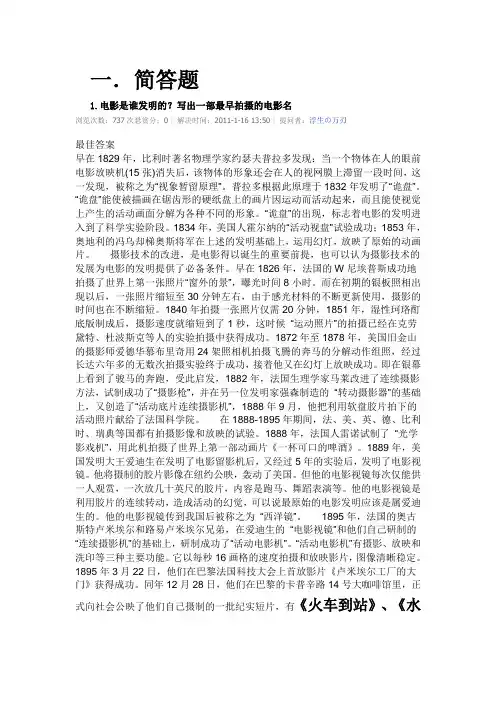
一.简答题1.电影是谁发明的?写出一部最早拍摄的电影名浏览次数:737次悬赏分:0 |解决时间:2011-1-16 13:50 |提问者:浮生の万刃最佳答案早在1829年,比利时著名物理学家约瑟夫普拉多发现:当一个物体在人的眼前电影放映机(15张)消失后,该物体的形象还会在人的视网膜上滞留一段时间,这一发现,被称之为“视象暂留原理”。
普拉多根据此原理于1832年发明了“诡盘”。
“诡盘”能使被描画在锯齿形的硬纸盘上的画片因运动而活动起来,而且能使视觉上产生的活动画面分解为各种不同的形象。
“诡盘”的出现,标志着电影的发明进入到了科学实验阶段。
1834年,美国人霍尔纳的“活动视盘”试验成功;1853年,奥地利的冯乌却梯奥斯将军在上述的发明基础上,运用幻灯,放映了原始的动画片。
摄影技术的改进,是电影得以诞生的重要前提,也可以认为摄影技术的发展为电影的发明提供了必备条件。
早在1826年,法国的W尼埃普斯成功地拍摄了世界上第一张照片“窗外的景”,曝光时间8小时。
而在初期的银板照相出现以后,一张照片缩短至30分钟左右,由于感光材料的不断更新使用,摄影的时间也在不断缩短。
1840年拍摄一张照片仅需20分钟,1851年,湿性珂珞酊底版制成后,摄影速度就缩短到了1秒,这时候“运动照片”的拍摄已经在克劳黛特、杜波斯克等人的实验拍摄中获得成功。
1872年至1878年,美国旧金山的摄影师爱德华慕布里奇用24架照相机拍摄飞腾的奔马的分解动作组照,经过长达六年多的无数次拍摄实验终于成功,接着他又在幻灯上放映成功。
即在银幕上看到了骏马的奔跑,受此启发,1882年,法国生理学家马莱改进了连续摄影方法,试制成功了“摄影枪”,并在另一位发明家强森制造的“转动摄影器”的基础上,又创造了“活动底片连续摄影机”,1888年9月,他把利用软盘胶片拍下的活动照片献给了法国科学院。
在1888-1895年期间,法、美、英、德、比利时、瑞典等国都有拍摄影像和放映的试验。
影视鉴赏结课作业
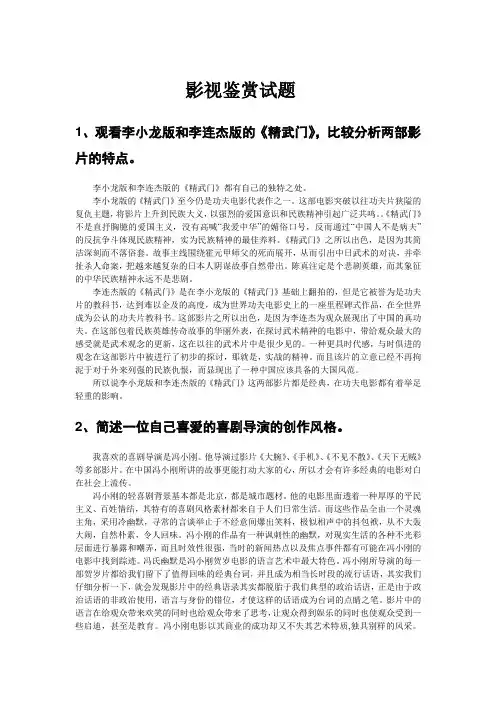
影视鉴赏试题1、观看李小龙版和李连杰版的《精武门》,比较分析两部影片的特点。
李小龙版和李连杰版的《精武门》都有自己的独特之处。
李小龙版的《精武门》至今仍是功夫电影代表作之一。
这部电影突破以往功夫片狭隘的复仇主题,将影片上升到民族大义,以强烈的爱国意识和民族精神引起广泛共鸣。
《精武门》不是直抒胸臆的爱国主义,没有高喊“我爱中华”的媚俗口号,反而通过“中国人不是病夫”的反抗争斗体现民族精神,实为民族精神的最佳养料。
《精武门》之所以出色,是因为其简洁深刻而不落俗套。
故事主线围绕霍元甲师父的死而展开,从而引出中日武术的对决,并牵扯杀人命案,把越来越复杂的日本人阴谋故事自然带出。
陈真注定是个悲剧英雄,而其象征的中华民族精神永远不是悲剧。
李连杰版的《精武门》是在李小龙版的《精武门》基础上翻拍的,但是它被誉为是功夫片的教科书,达到难以企及的高度,成为世界功夫电影史上的一座里程碑式作品,在全世界成为公认的功夫片教科书。
这部影片之所以出色,是因为李连杰为观众展现出了中国的真功夫。
在这部包着民族英雄传奇故事的华丽外表,在探讨武术精神的电影中,带给观众最大的感受就是武术观念的更新,这在以往的武术片中是很少见的。
一种更具时代感,与时俱进的观念在这部影片中被进行了初步的探讨,那就是,实战的精神。
而且该片的立意已经不再拘泥于对于外来列强的民族仇恨,而显现出了一种中国应该具备的大国风范。
所以说李小龙版和李连杰版的《精武门》这两部影片都是经典,在功夫电影都有着举足轻重的影响。
2、简述一位自己喜爱的喜剧导演的创作风格。
我喜欢的喜剧导演是冯小刚。
他导演过影片《大腕》、《手机》、《不见不散》、《天下无贼》等多部影片。
在中国冯小刚所讲的故事更能打动大家的心,所以才会有许多经典的电影对白在社会上流传。
冯小刚的轻喜剧背景基本都是北京,都是城市题材。
他的电影里面透着一种厚厚的平民主义、百姓情结,其特有的喜剧风格素材都来自于人们日常生活。
而这些作品全由一个灵魂主角,采用冷幽默,寻常的言谈举止于不经意间爆出笑料,极似相声中的抖包袱,从不大轰大闹,自然朴素,令人回味。
选修课作业(影视音乐赏析)
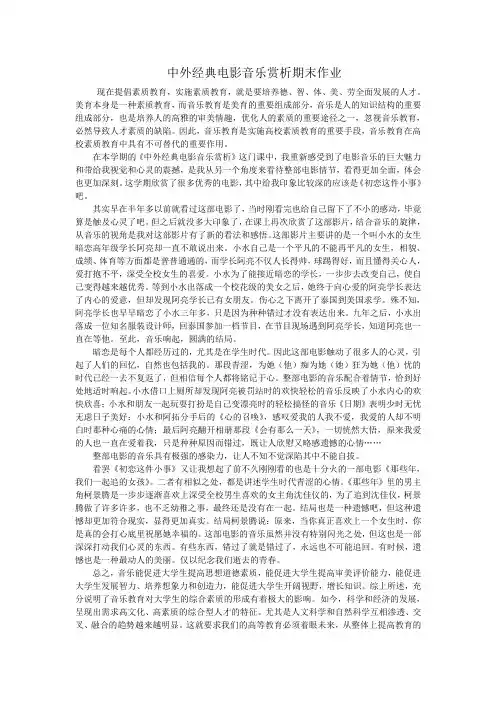
中外经典电影音乐赏析期末作业现在提倡素质教育,实施素质教育,就是要培养德、智、体、美、劳全面发展的人才。
美育本身是一种素质教育,而音乐教育是美育的重要组成部分,音乐是人的知识结构的重要组成部分,也是培养人的高雅的审美情趣,优化人的素质的重要途径之一,忽视音乐教育,必然导致人才素质的缺陷。
因此,音乐教育是实施高校素质教育的重要手段,音乐教育在高校素质教育中具有不可替代的重要作用。
在本学期的《中外经典电影音乐赏析》这门课中,我重新感受到了电影音乐的巨大魅力和带给我视觉和心灵的震撼,是我从另一个角度来看待整部电影情节,看得更加全面,体会也更加深刻。
这学期欣赏了很多优秀的电影,其中给我印象比较深的应该是《初恋这件小事》吧。
其实早在半年多以前就看过这部电影了,当时刚看完也给自己留下了不小的感动,毕竟算是触及心灵了吧。
但之后就没多大印象了,在课上再次欣赏了这部影片,结合音乐的旋律,从音乐的视角是我对这部影片有了新的看法和感悟。
这部影片主要讲的是一个叫小水的女生暗恋高年级学长阿亮却一直不敢说出来。
小水自己是一个平凡的不能再平凡的女生,相貌、成绩、体育等方面都是普普通通的,而学长阿亮不仅人长得帅,球踢得好,而且懂得关心人,爱打抱不平,深受全校女生的喜爱。
小水为了能接近暗恋的学长,一步步去改变自己,使自己变得越来越优秀。
等到小水出落成一个校花级的美女之后,她终于向心爱的阿亮学长表达了内心的爱意,但却发现阿亮学长已有女朋友。
伤心之下离开了泰国到美国求学。
殊不知,阿亮学长也早早暗恋了小水三年多,只是因为种种错过才没有表达出来。
九年之后,小水出落成一位知名服装设计师,回泰国参加一档节目,在节目现场遇到阿亮学长,知道阿亮也一直在等他。
至此,音乐响起,圆满的结局。
暗恋是每个人都经历过的,尤其是在学生时代。
因此这部电影触动了很多人的心灵,引起了人们的回忆,自然也包括我的。
那段青涩,为她(他)痴为她(她)狂为她(他)忧的时代已经一去不复返了,但相信每个人都将铭记于心。
影视鉴赏课后答案
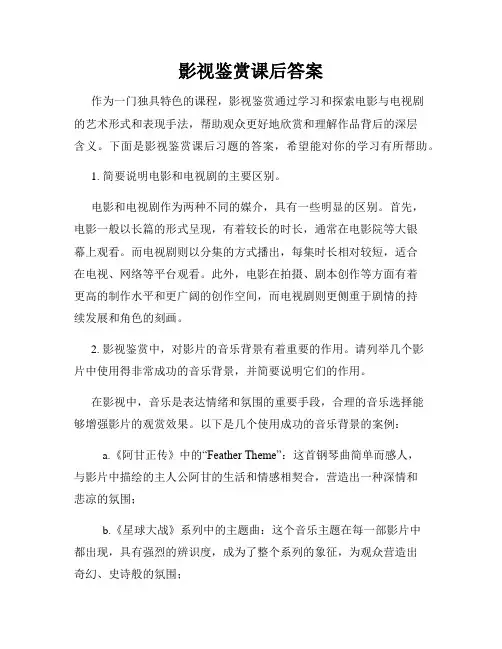
影视鉴赏课后答案作为一门独具特色的课程,影视鉴赏通过学习和探索电影与电视剧的艺术形式和表现手法,帮助观众更好地欣赏和理解作品背后的深层含义。
下面是影视鉴赏课后习题的答案,希望能对你的学习有所帮助。
1. 简要说明电影和电视剧的主要区别。
电影和电视剧作为两种不同的媒介,具有一些明显的区别。
首先,电影一般以长篇的形式呈现,有着较长的时长,通常在电影院等大银幕上观看。
而电视剧则以分集的方式播出,每集时长相对较短,适合在电视、网络等平台观看。
此外,电影在拍摄、剧本创作等方面有着更高的制作水平和更广阔的创作空间,而电视剧则更侧重于剧情的持续发展和角色的刻画。
2. 影视鉴赏中,对影片的音乐背景有着重要的作用。
请列举几个影片中使用得非常成功的音乐背景,并简要说明它们的作用。
在影视中,音乐是表达情绪和氛围的重要手段,合理的音乐选择能够增强影片的观赏效果。
以下是几个使用成功的音乐背景的案例:a.《阿甘正传》中的“Feather Theme”:这首钢琴曲简单而感人,与影片中描绘的主人公阿甘的生活和情感相契合,营造出一种深情和悲凉的氛围;b.《星球大战》系列中的主题曲:这个音乐主题在每一部影片中都出现,具有强烈的辨识度,成为了整个系列的象征,为观众营造出奇幻、史诗般的氛围;c.《泰坦尼克号》中的主题曲“My Heart Will Go On”:这首歌曲成为了电影的代表,通过旋律和歌词表达了主人公之间的爱情,成为了一种经典的浪漫主义的象征。
3. 影视作品的导演在整个创作过程中扮演着重要的角色。
请列举一位你认为非常优秀的导演,并解释其为什么被认为是优秀的。
马丁·斯科塞斯是我认为非常优秀的导演之一。
他以其对细节的精益求精和对故事架构的把握而闻名。
他的作品涵盖了各种不同的题材和风格,例如《愤怒的公牛》、《出租车司机》和《教父》系列电影。
他以其深厚的电影知识和对电影叙事的独到见解,成功地将自己的创意和想法转化为了令人难忘的电影作品。
西电影视鉴赏课后题
Unit1 The Graduate (1968)II Questions for ThoughtsThe following answers are given only for reference, and the students are encouraged to present their own understandings of or opinions on these questions.1. How do Benjamin Braddock’s parents celebrate his returning home? Does Benlike this idea?2. Who are invited to the party? What do they think of Ben? Why?3. How does Ben behave himself at the party? Why does he finally escape to hisroom upstairs?4. Who is Mrs. Robinson? How does she persuade Ben to drive her home?5. How does Mrs. Robinson make Ben stay with her in her house? What does Benthink of her?6. How does the family celebrate Ben’s birthday? Does Ben have a good time?Why?7. Why does Ben invite Mrs. Robinson to accompany him at the hotel?8. How does Ben manage to get a room at the hotel? Is he prepared for havingan affair with Mrs. Robinson?9.How do Ben’s parents plan for his future? Do they get suspicious of his behavior?10. How would you describe the relationship between Ben and Mrs. Robinson?Why does Ben insist on starting a conversation with her while they are together in the hotel room for the second time?11. What does Mrs. Robinson say about her marriage?12. What promise does Ben make to Mrs. Robinson? Does he promise her willingly?Why?13. Does Ben keep his promise? Why?14. How does Ben behave himself on his first date with Elaine? Why does hedo so?15. How does Elaine get to know that Ben had an affair with her mother? Howdo the daughter and the mother react to the revealing the truth?16. HOW does Ben know that Elaine left for Berkeley? What does he decide todo then?17. Does Ben have a substantial conversation with Elaine after he arrivedin Berkeley? Why? What does he do then?18. Why does Elaine go to visit Ben and then ask Ben to leave her alone? Doesshe believe in Ben’s words about his relationship with her mother?19. How does Mrs. Robinson get to know the affair? What does he decide todo?20. Why does Elaine refuse Ben’s proposal?21. How does Ben get to know that Elaine is going to marry Carl?22. How does Ben find the wedding church and how does he prevent the announcementof the marriage?23. How do Ben and Elaine manage to flee from the church?24. What do you think of Mrs. Robinson? Why does she seduce a boy who is almost20 years younger than herself? And why does she try to stop Ben from seeingher daughter?25. What do you think of Ben? Why does he start an affair with his father’s parent’s wife who is almost twice his age?Ⅴ. Research ActivitiesFour basic aspects of the movie:Background: historical background, social background, the novel on which the movie is based, the author of the novel, production of the movie, etc.Themes: the main ideas that the movie intends to convey to the audience. Conflicts: conflicts within oneself, conflicts with others, conflicts with the society, conflicts between events, conflicts of ideas, etc.Performances: actor, actress, director, playwright, song, music, Academy Awards, etc.These four aspects, however, can never be clear-cut; they are often interrelated. The information provided below serves as some supplementary material only. The students are free to present any material relevant to the four aspects. Their presentations should include both factual information and their own opinions or comments.Scarborough FairBy Simon& GarfunkelAre you going to Scarborough fair? Parsley, sage, rosemary and thymeRemember me to one who lives there; she once was a true love of mineTell her to make me a cambric shirt, Parsley, sage, rosemary and thyme Without no seams or needlework, then she’ll be a true love of mineTell her to find me an acre of land, parsley, sage, rosemary and thyme Between the salt water and the sea strand, then she’ll be a true love of mineTell her to reap it in a sickle of leather, parsley, sage, rosemary and thyme And to gather it all in a bunch of heather, then she’ll be a true love of mineAre you going to Scarborough fair? Parsley, sage, rosemary and thymeRemember me to one who lives there; she once was a true love of mineThe Sound of SilenceBy Paul SimonHello darkness, my old friend,I’ve come to talk with you again,Because a vision softly creeping,Left its seeds while I was sleeping,And the vision that was planted in my brainStill remainsWithin the sound of silence.In restless dreams I walked alone,Narrow streets of cobblestone,‘Neath the halo of a street lamp,I turned my collar to the cold and dampWhen my eyes were stabbed by the flash of a neon lightThat split the nightAnd touched the sound of silence.And in the naked light I sawTen thousand people, maybe more.People talking without speaking,People hearing without listening,People writing songs that voice never shareAnd no one dareDisturb the sound of silence.“Fools” said I, “You do not knowSilence like a cancer grows.Hear my words that I might teach you,Take my arms that I might reach you.”But my words like silent raindrops fell,And echoedIn the wells of silenceAnd the people bowed and prayedTo the neon god they made.And the sign flashed out its warning,In the words that it was forming.And the sign said, “The words of the prophetsAre written on the subway wallsAnd tenement halls.”And whispered in the sound of silence.Unit 2 Kramer vs. KramerⅡ.Questions for ThoughtsThe following answers are given only for reference, and the students are encouraged to present their own understandings of or opinions on these questions.1. Why does Joanna looks so sad while she is kissing her son good night? Whathas she decided to do?2. Is Ted prepared for this? Why is he so insensitive?3. What does Margaret tell Ted about Joanna? Has Ted become aware of the problem?Why or why not?4. How does Ted cook breakfast for Billy and himself for the first time? Whydoes Ted talk so much while cooking?5. Who is Mr. O’Conner? What is his attitude when he hears about Ted’s problem?6. When and how does Joanna explain her leaving to Billy?7. When Ted reads Joanna’s letter to Billy, how does Ted feel and how does Billyunderstand it?8. How is it for Ted to be a father and a mother at the same time? What doeshe do to make Billy happy?9. How does Ted explain to Billy one evening that Joanna’s leaving is his fault,not Billy’s?10. Does the family problem affect Ted’s work in the company? How doesMr. O’Conner treat Ted at his difficult time?11. Why does Joanna come back to New York? Where has she been? What hasshe been doing?12. How does Ted react when Joanna brings up the problem of the custodyof Billy? Why does Ted disagree to give the custody to Joanna?13. According to the family law attorney, what are the things that Ted should getprepared for if he decides to retain the custody? What kind of a pros-and-cons list does Ted work out?14. How does Joanna explain to the court why she wants to leave her husbandand son in the first place?15. In what way does Joanna believe that her experience in California helpsto regain her self-esteem?16. At the court, how does Ted argue for his right in his son’s life?17. Has Ted really changed as Margaret says?18. In what way does the legal battle make things rather tough and bitterfor both Joanna and Ted?19. What is the final verdict? Why doesn’t Ted appeal?20. How does Ted explain the court’s decision to Billy? How does the boy take it?21. Why does Joanna change her idea of taking Billy away from Ted?22. What does the director intend to convey in the movie?Answer to this question may vary.ⅴ. Research ActivitiesFour Basic Aspect of the MovieBackground: historical background, social background, the novel on which the movie is based, the author of the novel, production of the movie,etc.Themes: the main ideas that the movie intends to convey to the audience. Conflicts: conflicts within oneself, conflicts with others, conflicts with the society, conflicts between events, conflicts of ideas, etc.Performances:actor, actress, director, playwright, song, music, Academy Awards, etc.These four aspects, however, can never be clear-cut; they are often interrelated. The information provided below serves as some supplementary material only. The students are free to present any material relevant to the four aspects. Their presentations should include both factual information and their own opinions or comments.Unit 3 Splendor in the Grass (1961)II. Questions for ThoughtsThe following answers are given only for reference, and the students are encouraged to present their own understandings of or opinions on these questions.1. What’s the relationship between Deanie and Bud? In what way are they attractiveto each other?2. What is troubling Bud while being together with Deanie?3. What is Deanie’s confusion about love?4. What does Deanie’s mother, Mrs. Loomis, say about sex and virginity? How doesher advice Deanie to behave in front of boys?5. How does Bud’s father, Mr. Stamper, deal with his son’s romance with Deanie?6. What future does Bud’s father design for Bud? What does Bud himself like todo? Does his father listen to him? Why?7. What does Bud’s sister Ginny do that makes her become the talk of the town?8. According to Bud’s father, there are two kinds of girls—nice girls and badgirls. Do Deanie and Ginny represent these two kinds? Please give your comments.Answer to this question may vary.9. How does Ginny’s tragedy affect Bud? Why does Bud suddenly stop seeing Deanie?10. What happens to Deanie when she is asked by the teacher to explain the poem by William Wordsworth?Why does she feel so strongly about the poem?What is her interpretation of the lines?11. What is Mrs. Loomis suspicious of when she finds Deanie trying miserably to relax herself in the bathtub? How does Deanie react to her mother’s suspicious? Why does Deanie shout repeatedly to her mother that she is not spoiled?12. How does Deanie show up at the Bon Voyage Grads dance?Why does she do so?13. Why does Bud refuse Deanie at the parking lot? How does Deanie take his denial? What drives her to commit suicide?14. How does Bud feel when he sees Deanie lying in the hospital bed murmuring his name? Is Bud the cause of Deanie’s insanity? Why or why not?Answers to these questions may vary.15. How does Bud spend his time at Tale University? What does he do to disappoint his father?16. Why does Mr. Tamper commit suicide?17. Who does Deanie meet at the Wichita hospital? How does Deanie gradually get recovered?18. Why does Deanie decide to marry Johnnie Masterson when she leaves the hospital? What does her doctor suggest her to do when she goes back home? Why?19. Has Deanie’s mother reflected on her way of raising Deanie? How does she explain this to her daughter?20. when Deanie decides to see Bud, who tells her where he is, why does Deanie kiss her father?21. How does Deanie feel when she sees the changes in Bud’s life?(Answers to this question may vary.)22. Who should be blamed for the painful shattering of Deanie and Bud’s intense, youthful first love?Answers to this question may vary.23. What does the movie’s title imply?Answers to this question may vary.v. Research ActivitiesFour basic aspects of the movieBackground: historical background, social background, the novel on which the movie is based, the author of the novel, production of the movie, etc. Theme: the main ideas that the movie intends to convey to the audience. Conflict: conflicts within oneself, conflicts with others, conflicts with the society, conflicts between events, conflicts of ideas, etc. Performances: actor, actress, director, playwright, song, music, Academy Awards, etc.There four aspects, however, can never be clear-cut; they are ofteninterrelated. The information provided below serves as somesupplementary material only. The students are free to present anymaterial relevant to the four aspects. Their presentation shouldinclude both factual information and their own opinions or comments.Unit 4 Dead Poets SocietyII. Questions for ThoughtsThe following answers are given only for reference, and the students are encouraged to present their own understanding of or opinions on these questions1. Why do parents try to send their sons to the Welton Academy? What are the four pillars of the Academy?2. Who is introduced at the school opening ceremony as a new teacher?3. Why does Mr. Perry ask his son Neil Perry to drop some of the extracurricular activities? What tone does he when talking to his son? Why?4. What suggestions do the other boys put forward then? How does Neil act on it?5. What is the general classroom teaching at Welton like? Are the students attracted and stimulated by their teachers? Why or why not?6. In Mr. Keating’s first class, what teaching approach does he apply? What message does he try to convey to the boys? How do the boys like it?7. How would the boys address Mr. Keating if they are more daring? What is the sentiment of Carpe Diame?8. In his second class, which part of the literature textbook does Mr. Keating ask the boys to rip out? Why?9. Why are the romanticism and poems worth learning? How does Mr. Keating explain to the boys?10. What is Dead Poets Society according to Mr. Keating11. How is Neil Perry stimulated and what is he going to do?12. In Mr. Keating’s next class, what dose he intend to convey to the boys by standing on his desk?13. On anther day, why does Mr. Keating ask his boys to read aloud a famous line of a poem before they kick the soccer ball on the field?14. One day in a courtyard, why does Mr. Keating ask the boys to walk differently? What does he say to them about the importance of their own stride?15. How does the school authority respond to Mr. Keating’s way of teaching? What does the school master suggest him to do? What is Mr. Keating’s argument?16. Todd is a quiet and shy boy. How does Mr. Keating stimulate him to contribute his own verse in the classroom?17. Why do Todd’s parents send their son a study board as the birthday gift, the same birthday gift as last year? Why does Todd feel so depressed about it? What does he do with the study board at last? What does that indicate?18. Why is Neil so excited about being able to play a role in the play? Does he worry about his father’s certain objection?19. Does Neil’s father find out about his son’s decision later? What does Neil’s father force him to do?20. Why does Neil go to Mr. Keating’s room the night before the play? What does Mr. Keating suggest Neil to do? Does Neil act on the teacher’s suggestion? Why or why not?21. Neil’s performance a success? How is he welcomed and appreciated by the peer performers and the audience? How does his father feel instead? What does he say to Neil?22. why does Neil commit suicide? Who should be blamed, his father, Mr. Keating, the school, or Neil himself? Please comment on it.23. what happens to Mr. Keating after the incident? Should the school authority put the blame on Mr. Keating? why or why not?Answers to the last two questions may vary.24. How does Todd show his protest of Mr. Keating’s dismissal? Do the other boys follow suit? What gives them the courage to do so?25. What the essence of Mr. Keating’s teaching? Do the boys seize it?Answers to these questions may vary.Unit 5 Philadelphia (1993)II. Questions for ThoughtsThe following answers are given only for reference, and the students are encouraged to present there own understandings of or opinions on these questions.1. Why does Andrew go to the hospital for a blood test? What seems to be his problem?2. Why does the law firm Wyant Wheeler give the High Line case to Andrew?3. When shaking hands with Andrew, Walter Kenton notices the lesion on Andrew’s face. How does he react? Does Andrew tell him what it is? Why?4. Why does the High Line complaint suddenly vanish during Andre’s leave? Doesthis happen accidently? Why?5. What is the relationship between Andrew and Miguel? How can you tell?6. For what reason is Andrew fired by the firm? What does Andrew think is the realreason the firm fires him? What does he decide to do?7. When Andrew comes to Joe, asking for help, does Joe agree to accept his client?Why? What kind of opinion does Joe hold toward homosexuals and people who are infected with AIDS?8. Why does Andrew go to the library? Why does the librarian suggest Andrew usethe private research room? How does Andrew react to his suggestion?9. Joe happens to be in the library that evening. Why does Joe later decide torepresent Andrew in his suit against Wyant Wheeler?10. What do the family members say about Andrew’s decision to go to the trial?11. What are the points Joe presents to the jury in his opening speech at the court?How does Belinda, the defendant lawyer, refute his points?12. How does Joe examine Mr. Laird about his comments on Andrew’s working ability? What is he trying to prove?13. What is the public opinion toward homosexuality? How does Joe reply to thequestion raised by a lady reporter regarding the special treatment for homosexuals?Does he personally believe what he says?14. How do Joe’s colleagues look at Joe after he takes the case for Andrew? Howdoes Joe resist to the pressure of such opinion?15. Maria Torres, a witness who used to be infected with AIDS through bloodtransfusion. How does she get involved in this case? How does her previous employer, one of the board members at Wyant Wheeler now, threat her at that time?16. Why does Joe invite African American Anthea Burton at Wyant Wheeler to the courtas a witness?17. Why does Joe suddenly ask witness Jamey Collins the question whether he is agay? What seems to be the other issue that is actually being discussed at the court besides AIDS?18. How does Joe attack Walter Kenton at the court regarding the issue homosexuality?19. Does the deadly disease scare Andrew? How hard does he fight for the justiceof the law?How hard does he fight for the justice of the law?20. Why do Andrew and Miguel hold a gay party one evening before the final trialon Monday?21. What opera does Andrew listen to when he is with Joe alone after the party? Whydoes he love to listen to this opera? Is Joe impressed somehow by the opera? Why?22. What does Andrew love the law the most according to his answer to Joe at thecourt?23. What is the final verdict? What does the director intend to tell in his movie?V. Research ActivitiesFour basic aspects of the movieBackground: historical background, social background, the novel on which the movie is based, the author of the novel, production of the movie, etc.Themes: the main ideas that the movie intends to convey to the audience. Conflicts: conflicts within oneself, conflicts with others, conflicts with the society, conflicts between events, conflicts of ideas, etc.Performances: actor, actress, director, playwright, song, music, Academy Awards, etc.These four aspects, however, can never be clear-cut; they are often interrelated. The information provided below serves as some supplementary material only. The students are free to present any material relevant to the four aspects. Their presentations should include both factual information and their own opinions or comments.Unit 6 American BeautyⅡ. Questions for ThoughtsThe following answers are given only for reference, and the students are encouraged to present their own understandings of or opinions on these questions.1.Is the Burnham’s family a typical American middle-class family? How can you tell?2. What kind of life does Lester think he is living? What problems is Lesterfaced with in his career and family?3. Is Carolyn satisfied with her life? What is her idea of success?4. Why does Jane feel bitter about her life?5. Who is Angela? How are Jane and Angela different from each other inappearance and in personality? How can these two girls keep a friendship?6. How does Lester get to know Angela? What does she say one day that seemsto help him get back his vitality he has lost for long? What does he do to regain his vitality?7. Where does Lester meet Ricky, his new neighbor? Why does he think Ricky ishis personal hero?8. Why does Lester finally quit his job with the magazine and takes a job at a fastfood restaurant?9. What does Carolyn do to get herself out of the deep disappointment with her life?10. What has Carolyn found out from her close relationship with King? Is he reallyas successful in his life and career as she expects?11. Why does Ricky become so obsessed with his video camera? Why does that flyingwhile plastic bag attract him? What is beauty in his eyes?12. How do Ricky and Jane gradually become friends? How does Ricky help Jane outof her bitterness?13. Who is Colonel Fits? Why does he collect guns and keep a plate with a swastika?14. In what way does Colonel Fits treat his son, Ricky? Is Ricky obedient to hisfather?15. What attitude does Colonel Fits hold toward the gay neighbors? Why?16. What does Colonel Fits suspect about the relationship between his son and Lester?17. Why does Colonel Fits go to Lester’s garage on that storming night?18. Why does Angela feel hurt when Ricky says she is just ordinary?19. Why is Lester surprised when Angela says this is her first time?20. Can you explain the two sentences by Lester “You are beautiful. You are sobeautiful”?21. Who kills Lester? Why?22. What does the title “American Beauty” refer to?23. What does the color of rose symbolize in this film?Unit 7 The Shawshank RedemptionⅡ.Questions for ThoughtsThe following answers are given only for reference, and the students are encouraged to present their own understandings of or opinions on these questions.1. Who is Andy? Why is he brought to the court? How does Andy defend for himself?How does the court rule his case?2. Who is Red? How does he describe Andy at his first sight at him in ShawshankPrison? How does Andy impress Red later? How unusual is this new guy in Red’s eye?3. After 20 years’service in prison, Red is brought to a parole hearing. What question is raised? How does he answer the question? Why is his application rejected?4.What hardships has Andy experienced during his first two years in Shawshank? Why does he remain silent to the unfair verdict by the government and the abuses by the inmates?5. Why does Andy walk to the chief prison guard giving him advice on the tax matter at the risk of his life? What does the beautiful smile on his face tell when he is watching his fellow inmates drinking the beer earned by hum?6. Why does Warden Norton offer Andy a better job, working in the prison library?7. After 50 years in prison, old Brooks is finally on parole. However, is he happy with the life outside? Why does he commit suicide at the halfway house?8. what does Andy do to build up the library? Why is he so developed to it?9. why does Andy venture to the guard office and broadcast Mozart all over the prison? How does the music affect the prisoners?10.how is Andy punished for playing Mozart’s music、what supports him during the punishment?11. why is red rejected again at the parole hearing after 30 years service? Why does Andy buy him a harmonica as a gift?12.What program does Norton put on this year to impress the public that he is a caring and democratic warden? What dirty deals does he make behind the scenes?13 .How does Andy help Norton accumulate the filthy wealth arousing any suspicion?Why does Andy do so?14. What is the astonishing news that Tommy, the new comer, breaks to Andy? Is Nortonwilling to help Andy find out the real killer of his wife? Why?15. Why does Andy continue to work for Norton after he is released from the solitaryconfinement?16. Where is Zihuatanejo? Why does Andy dream for the place? What does Red thinkof his idea of living in Zihuatanejo?17. What does Red promise Andy to do if someday he gets out of Shawshank?18. Why do Red and some other inmates feel that Andy is a bit strange that day? Whydoes Red say that storming night is the longest night of his life?19. What surprises Norton and the guards the next morning? What do they find in Andy’s cell?20. How does Andy escape the night? What is it that supports him to strive?.21 how does Andy take revenge against Norton? What happens to Norton at last?22. Where is Andy heading for after he finishes his prison journey?23. At the third parole hearing after 40 years` service, Red`s application is approved. Why?24. Why doesn`t Red enjoy his life out of Shawshank? What is the one thing that stopshim from committing suicide?25. What is written in the letter Andy leaves for Red in the secret hole in thehayfield? Why does Andy make such an arrangement?26. What does Andy mean by saying that “I guess it comes down to a simple choice,really. Get busy living or get busy dying?”Answers to this question may vary.V.Research ActivitiesFour basic aspects of the movieBackground: historical background, social background, the novel on which the movie is based, the author of the novel, production of the movie, etc.Themes: the main ideas that the movie intends to convey to the audience. Conflicts: conflicts within oneself, conflicts with others, conflicts with the society, conflicts between events, conflicts of ideas, etc.Performances: actor, actress, director, playwright, song, music Academy Awards, etc.These four aspects, however, can never be clear-cut; they are often interrelated. The information provided below serves as some supplementary material only. Thestudents are free to present any material relevant to the four aspects. Their presentations should include both factual information and their own opinions or comments.Unit 9 Jungle Fever (1991)Ⅱ.Questions for ThoughtsThe following answers are given only for reference, and the students are encouraged to present their own understandings of or opinions on these questions.1. Who is Flipper?2. Does he have a happy family? How does he get along with his wife and his daughter?3. What kind of neighborhood does Flipper come from? How do his parents impress you?4. Who is Angie? What kind of family and neighborhood does she come from?5. How does Flipper feel when he is introduced to his new secretary Angie in the office? Why?6. How does Flipper get along with Angie? What happens between them one evening after dinner in the office? Why does it happen?7. How does Flipper do in his company? How do the heads of the company respondto his application for the promotion? What might be the reason for the refusal?8. What plan does Flipper have for his future? Does his best friend Cyrusbelieve it’s wise for him to quit? Why?9. What does Flipper confide to Cyrus one day? What is Cyrus’s response?10.What does Cyrus mean by saying that both Flipper and Angie get a “Jungle Fever?”11.How do Angie’s two girl friends react when she confides to them about the affairshe has with Flipper? How do they regard the interracial affair?12.How does Drew, Flipper’s wife, react when she learns about her husband’s affairwith the white secretary? What makes her so furious, the affair itself or any other factor as well?13.What are the attitudes of Drew’s black girl friends towards the interracialaffair?14.How do Flipper’s parents regard his affair? What does Flipper’s father do?15.When word gets to Angie’s neighborhood about her romance with Flipper, whatdoes her father do to her and what do the neighbors think of her? Why are they so enraged?16.Why do the policemen come when Flipper and Angie are teasing each other in thestreet of the white neighborhood?17.Is the relationship between Flipper and Angie flowering? Are they stillattractive to each other as much as before?18.Why does Flipper say that he will never have any child with Angie?19.Why does Flipper decide to break up with Angie? How does he explain to her? Howdoes Angie take it?。
影视艺术鉴赏结课作业
影视艺术鉴赏结课作业《爱》是一个残酷的故事,迈克尔·哈内克的娴熟技巧和作者性的个人风格已经到了大象无形的境界,你甚至察觉不到戴瑞尔斯·康吉的摄影高难度的技术性,察觉不到法国钢琴家亚历山大·萨罗配乐的纯净高雅,但你一定能记住生活的无可奈何和那份残酷的温柔。
这本是一个戏剧性十足的故事,但导演却在弱化戏剧性,比如对情节的留白和隐喻性符号的加入,在有意让影片的技巧性和人为痕迹无形之后,影片最后被提炼出一种情绪。
这就像乔治(让-路易斯·特林提格南特饰)给安妮(埃玛妞·丽娃饰)讲述童年时看电影的经历那样,他已经想不起来电影拍的究竟是什么,记不住演员和故事,但却清晰记得当时向别人复述电影时自己的激动情绪,记忆深处的那种感觉。
也许《爱》就是这样的电影,很多年之后,你兴许记不住这部电影的细节,记不住摄影、场景和场面调度,记不住故事和演员,甚至记不住那几句戳痛人心的对白,但你一定能记住那种绝望的情绪,一个老人在生老病死前的无奈。
生老病死是一种全人类共通的情感,无论你身在世界的任何角落,它总能颇具代入感地让你产生情感共鸣。
影片中这对法国中产阶级的老夫妻,他们是音乐教师,退休后住在一个宽敞的公寓里。
他们算是中产阶级代表,去欣赏音乐会,回家还要来杯红酒,也许唯一的烦恼就是女儿混乱的生活。
直到老太太被检查出动脉栓塞,在手术失败后半身不遂瘫痪在床。
在生活和病痛的折磨之后,老头选择了另一种绝望的爱的表达方式。
《爱》发生在法国巴黎,但这不由得让人想到10月中旬一则引发争议的国内新闻,甘肃农村的进城农民工,一个村里公认的好男人,在精心照料瘫痪在床的妻子8年之后最终夫妻绝望,夫妻俩在黄河边徘徊12个小时,最后妻子主动要求丈夫将自己推入江中。
即便不去分析它背后的社会意义和悲剧发生的问题根源,但这和《爱》却有着异曲同工之妙,难道这不算爱吗?长年累月的疾病不仅折磨着患者,更折磨着亲属,最终一点点地摧毁常人的理智。
选修课 影视鉴赏 作业答案
4、美国电影《摇尾狗》是以海湾战争为背景题材的。(8.00分)
是否
5、电影是梦或神话,比如《淘金记》《甲方乙方》《小五》等作品均体现了这点。(8.00分)
是否
电影的文化维度(二)作业( 0分)
单选题(60分)
1、电影《黄土地》的主题是:()(12.00分)
A.陕北人民独特的生活B.黄河和黄土高原对于中华民族的意义C.反思中华民族的文化之根D.顽强的生命力
是否
5、纪实主义电影美学的源头是卢米埃尔兄弟:《北方的那努克》《水浇园丁》。(10.00分)
是否
后现代主义电影美学作业( 80.0分)
单选题(50分)
1、电影《广岛之恋》故事发生的国家是:()(10.00分)
A.日本B.法国C.德国D.菲律宾
正确答案:A
2、下列哪个电影类型不属于按形式分的电影类型(10.00分)
1、陈旭光提出的电影鉴赏的关键词不包括下列哪个词:()(12.00分)
A.窗户B.镜子C.房子D.梦
未作答!正确答案:C
2、下面哪一部是折射隐喻现实的电影:()(12.00分)
A.《神话》B.《阿甘正传》C.《后窗》D.《淘金记》
未作答!正确答案:C
3、下列哪部电影没有反映电影是现实的一种梦或神话(12.00分)
A.《星战前传》B.《独立日》C.《断臂山》D.《阿凡达》
正确答案:C
5、张艺谋执导的第一部反映城里人生活的影片是下面哪一部:()(10.00分)
A.《有话好好说》B.《红高粱》C.《一个也不能少》D.《英雄》
正确答案:A
多选题(0分)多选、少选均不得分
判断题(50分)
1、电影作为一种多元化文化,与意识形态的关系不大。(10.00分)
影视鉴赏
《影视鉴赏》课程作业 2011年秋季学期姓名:郭力源班级: 141021班学号: 14102022日期: 2011.12.11《影视鉴赏》作业姓名:郭力源班级:141021班学号:14102022 一.电影艺术的特征影视艺术的基本特征主要表现在以下5个方面:(1)综合性电影电视都是综合艺术。
综合性是他们都具有的特征。
可以从以下4个方面来理解影视艺术的综合性特征。
第一,艺术与技术的结合。
第二,多种艺术元素的有机结合。
它是融文学、戏剧、绘画、音乐、舞蹈、建筑等多种艺术元素于一炉的新型的现代综合性艺术。
第三,时间艺术与空间艺术的综合。
第四,以导演为组织领导者的艺术集体的智力的综合。
影视不仅是综合艺术,也是综合技术。
(2)视觉性影视艺术的审美形式是一种以视觉造型为主的视听综合艺术。
影视艺术的一个本质特征,就表现为他们的视觉造型。
影视的视觉美,体现在由光线、色彩、影调所显示的运动的银幕、屏幕形象上。
影视的这个特征,是由它们本身所具有的规律决定的。
通常人们说的看电影、看电视,正好表现了影视观众的基本心理要求。
(3)逼真性真实地反映生活,是对一切艺术的共同的基本的要求。
但是在众多艺术形式中,影视是以逼真地反映生活为其长处与特征的。
影视艺术正是靠了逼真的反映生活,使万千观众为之倾倒的。
逼真性是影视的生命。
银幕上任何虚假失真的东西,都会影视艺术的效果,都会破坏视觉形象的可信度。
谈到影视艺术的逼真性的时候,还应该注意一点,这就是说影视艺术不能搞自然主义“有闻必录”,也并不排斥艺术应有的假定性、虚拟性。
(4)组接性(蒙太奇)影视作品都是镜头组接而成的,蒙太奇是电影艺术的基础。
蒙太奇也是影视重要的、特有的思维方式、表现手段,是影视的主要特征之一。
蒙太奇本是法语montage的音译,是建筑学上术语,原义是构成、装配,用到影视艺术中来,则是组合、剪接的意思。
电影真正成为一项公认的艺术传播媒介,始于“蒙太奇”电影美学观念的诞生。
- 1、下载文档前请自行甄别文档内容的完整性,平台不提供额外的编辑、内容补充、找答案等附加服务。
- 2、"仅部分预览"的文档,不可在线预览部分如存在完整性等问题,可反馈申请退款(可完整预览的文档不适用该条件!)。
- 3、如文档侵犯您的权益,请联系客服反馈,我们会尽快为您处理(人工客服工作时间:9:00-18:30)。
影视鉴赏作业
班级:***
学号:***
姓名:***
一、简述电影艺术的特征
1、逼真性
电影接近生活本身,能逼真反映生活,可以表现生活的原生状态。
电影的逼真性建立在摄影的逼真性的基础上。
逼真不是生活的复制。
2、视象性
电影通过活动的画面叙事,表达主题,刻画人物,主要诉诸人的视觉感官。
电影的视象性决定了其对象必须是具体可见的,决定了电影创作思维的独特方式,即画面思维。
电影是视听结合的艺术,即影像和声音结合的艺术。
当然,“视”与“听”二者在电影中的地位是不相等的。
应该明确指出:电影“视”第一,“听”第二。
或者说,电影是以“视”为主,“听”为辅的艺术形式。
①电影的诞生,其实就是影像的诞生。
1895年--1927年都
是无声电影。
爱森斯坦、格里菲斯、卓别林的影片影像的表现
力可谓登峰造极。
②就相同时间所提供的信息量而言,影像是得天独厚的。
据国外脑生理学者和电子计算机信息工程学者共同测试的结果:相同时间内,人们所获得的信息量,视觉信息是听觉信息的900
多倍。
③影像能够跨过艺术品与欣赏者之间的障碍,直接走入人
的心灵,这一点是最重要的。
巴拉兹说:“从古希腊一直到今天,欧洲美学和艺术哲学始终有这样一个基本原则:在艺术作品和观众之间存在着一个外
在的和内在的距离,一种两重性。
这个原则的含义就是:每一
件艺术作品都由于其本身的完整结构而成为一个有它自己规律
的小世界……艺术作品由于画面的边框、雕像的台座或舞台的
脚光而与周围的经验世界产生了隔阂,‘电影的发明’却使欣赏
者和艺术品之间永恒的距离在观众的意识中完全消失,而随着
外在距离的消失,同时也消除了这两者之间的内在距离。
”
3、运动性
电影通过连续不断的画面表现运动着的人和事物,使其在运动中获得叙事功能。
被表现对象自身运动。
摄影机自身运动。
4、蒙太奇
没有蒙太奇,电影就不能成为一门独立的艺术。
蒙太奇不仅是一种技巧,也是电影艺术创造的重要手段。
蒙太奇不是两
数之和,而是两数之积。
二、比较冯小刚和周星驰喜剧电影风格的异同
冯小刚和周星驰两人的喜剧属于地域文化差异下的不同幽默。
冯的电影主要是以北方小市民的生活为背景的,主要从北方人,特别是北京人对幽默的感觉上下手,来诠释平常生活中的喜剧情节。
这使得冯的电影里或多或少的都带有点北京味。
如《甲方乙方》、《大碗》、《一声叹息》等都是以北方小市民的生活为基调的,对白也都是带有
京味的普通话。
喜剧成分都是来源与这种京味的普通话的感觉以及生活中幽默形式的集结。
其片中透露出来的生活气息很浓。
周星驰身处香港,所拍的电影也同样是表现小人物居多,但是他电影中的背景、基调都是以香港、广东的文化氛围为蓝本的,《长江七号》虽说在周的家乡宁波拍摄,但是味道依然是广东和香港的。
对白多是广东话,幽默成分也以广东话中所固有的笑料、方言为基础,这就是所谓的“无厘头”。
如《逃学威龙》系列等。
所以有时候看翻译成普通话的周星驰电影会觉得搞笑的味道不浓。
这两种不同的幽默成分可以说是冯、周两位导演、演员所处的地域文化环境不同造成的。
艺术是来源与生活的,尤其是创作者所处的生活环境,他们只能运用自己比较熟悉的文化材料。
在幽默的表现方式上,二人的电影既有相同点也有不同的成分。
首先,相同点,在二人的系列电影中,都有一个核心的喜剧演员,即葛优和周星驰,二人在喜剧表演上的造诣都是达到非常高的境界的,电影中也正是由于他们的出色表演,搞笑成分才那么足,可以设想如果他们在电影中的句句经典台词是出自另外人之口,一定失去了那个味道了。
其不同点是,冯电影中的喜剧成分是从现实生活中提取的,都源于生活,并没有高于生活而主观臆造,所以看来给人一种可以模仿的亲切感,如《大碗》,最多给人一种贫嘴的感觉;而周的电影中的喜剧成分虽然也有是源于生活的形式或者话语,但是其中有非常多的夸张、幻想成分,甚至很多地方给人一种为了搞笑而搞笑的感觉,尽管可以博得众多的笑声,如《破坏之王》中极尽夸张的手法。
冯周二人的电影表现方式上还存在着源于现实和充分发挥想象力的区别。
冯的电影源于生活,从日常生活中汲取素材,表演又是现实手法,所以这样的喜剧片有种现实幽默主义倾向,如《一身叹息》、《手机》都是就现实的婚外恋为题材的;而周的电影多带有很多幻想色彩,表现手法多夸张,尽情渲染,如《百变星君》《功夫》等等很多优秀代表作品,虽然也是拍现实生活的事情,但是这种现实中的一切都已经加上了想象力的飞跃了,所以周的电影有种浪漫搞笑主义色彩,《长江七号》中的外星人,《赌侠II之上海滩赌圣》中的穿越情节凸显了星爷无比丰富的想象力与创造力。
三、简述中国电影艺术的思想
从传统和历史角度概括含三个方面:
1、实用美学
中国是一个注重实践的民族,中国人的思维方式带上了一种实用理性精神。
实用理性精神的影响使中国的电影理论不是发展成为一整套抽象的思辨美学,而是形成一种和批评实践与技巧总结理论相结合的实用美学。
2、以社会功能为核心
中国人伦理型的文化精神,在文学艺术中形成了“文以载道”的思想传统。
这使中国电影理论相对注重电影功能的研究,并且不是停留于抽象的载道功能,而是和具体的社会──历史条件结合起来,成为一种以社会功能为核心的电影本体论。
并具体演化为对电影和时代、电影和社会、电影和人民、电影和政治等一系列关系的研究。
3、戏剧本性
中国传统的理论思维方式侧重于直观整体的把握方式,所以中国电影理论在对电影基本结构的研究上侧重于情节──剧作水平的研究,而不是影像──镜头水平的研究。
剧作是中国电影理论本体论的基本出发点。
正是在这一水平上,中国传统的电影理论提出了其核心概念“影戏”这一概念强调电影的戏剧本性,而把“影”看作是完成“戏”的手段。
当今随着经济全球化影响,世界范围内的文化冲撞与交流,中国电影艺术的思想呈现多元化发展,极大推动了中国电影事业的繁荣与发展。
四、简述美国好莱坞电影的特点
作为世界最具声誉与影响力的电影流派之一,美国好莱坞电影的突出贡献在于以大制片厂和明星制为基础,把电影工业体系发展到了极致。
大制片厂制如著名的八大电影公司:米高梅(MGM)、派拉蒙、20世纪福克斯、华纳兄弟、雷电华(RKO)、环球、联美、哥伦比亚公司,它们大多集制片、发行和放映于一体的大型垄断公司,强调制片人权威和演员作用。
于是出现了一大批享誉世界的导演和明星演员。
纵观好莱坞发展史,好莱坞电影美学风格在上世纪的六、七十年代有一次较大的变化,在此之前可以称为经典好莱坞时期,而之后则可成为新好莱坞时期。
卓别林创建了美国喜剧学派。
整个无声片时代,美国的喜剧学派一直是世界上独一无二的学派。
卓别林的天才给这学派创造了光辉的成绩。
1912-1930年被称做是“美国电影戏剧最伟大的时代”。
20 世纪 30—40 年代是美国好莱坞的全盛时期,这期间在好莱坞影片创作中占统治地位的是类型电影,类型电影就是按照不同的类型(或样式)的规则要求创作出来的影片,实质上它是一种艺术产品标准化的规范。
类型片分为:西部片、强盗片、音乐片、喜剧片、科幻片、恐怖片、战争片、家庭情节片。
旧好莱坞电影的文化特征:首先是商品化特征,其次是大众娱乐,第三才是艺术。
好莱坞类型片的主要特征体现为:1.情节公式化 2.人物定性化 3.银幕叙事标准化 4.视觉形象图解化。
类型片在经典好莱坞时代的发展经历了形成期,成熟期和衰退期。
20世纪六、七十年代,美国好莱坞在经历了低谷之后,迎来了历史的转折,新好莱坞开创了好莱坞历史上的第二个黄金时期。
新好莱坞影片的艺术特点:对真实性的追求;揭露和触及社会现实问题;对传统类型片模式的突破和融合;文化价值取向的时代特征;艺术电影和商业电影的相互融合与平行发展。
